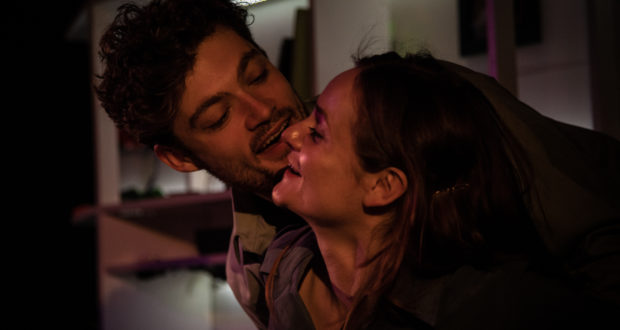A very pleasing return of an interesting script using minimal staging, exactly the way theatre should be done: a funny and moving comment on the world that leaves you pushing for politics while contemplating love and life.Summary
Rating
Excellent
LEMONS makes great use of the theatre as a genre. Some plays seem to be stories that could be novels or essays. But Lemons is necessarily on stage, cleverly using props placed in what might seem to be a simple order, but gradually everything is revealed. It’s helped by the non-linear plot, which cuts back and forth to explain gaps in the narrative, not only through the dialogue but also through the length of scenes.
At the beginning the scenes are quick and snappy, cutting through moments in their lives while the lights change from red to white. On their grey clothes are little patches of red. On one side of the bookcase – which forms the main background of the play – there is a red bottle of ketchup and on the other some white candles. Everything is split between pale and red.
As the scenes get longer you notice the need for this change, what it is that regulates the length of their lines. In the world of their burgeoning love, a law has been passed limiting Britons to 140 words per day. Bernadette (Jemima Murphy), the ‘bad’ half of the couple, worrys she is always morally inferior to Oliver (Charlie Suff), although his work as a lawyer could have done more to stop this law being passed. Bernadette worrys she didn’t go to the marches before the vote, whilst Oliver did. Bernadette’s solo scenes are longer and slower than Oliver’s, continuing this pulling force of the limiting law that stretches time out.
The merging of form and content is cleverly done, but it also has the problem of making the characters too predictable. As soon as Bernadette mentions the word limit Oliver is staunchly against it. His arguments – although interesting in our contemporary context in relation to Brexit and the self-melting spectacle of parliament – are quite uniform and unfulfilling. And Bernadette’s responses lack agency, making her only defend herself against him. This is only broken when, running out of words for the day, he says, ‘My favourite colour is blue,’ a slightly weak attempt at removing him from the grey/red scene. She says, ‘Mine’s red,’ at which the lights turn red. Their words are all used up. We’re back in darkness. She represents the colour of emptiness, of the law that limits speech.
The best piece of social criticism in the play is when Bernadette decides to join Oliver on a march against the “Quietude Bill”, the law of 140 words. When they get home she complains that no one spoke to her the whole time, but since he was speaking all day he has run out of words and cannot respond. As the representative of the law in this drama, she cannot handle it when her own rules are applied to herself. Suddenly she is furious at being silenced, at being ignored. He, meanwhile, as the representative of rebellion and ulterior opinions, is constantly spewing out his opinions, never really listening, and now he is silenced when he has the opportunity to be truly effective. Wrapped in a well-performed and entertaining scene, this felt a very intelligent comment on society and politics.
In addition to Bernadette lacking agency in all these scenes, Oliver spends too long with his mouth hanging open expressing his constant shock. Maybe it is part of the joke though about how seriously he takes his own opinions.
The sound is jarring and changes unnecessarily from scene to scene; the script and performance are strong enough to need only a suggestive background of music for most scenes. The lighting, however, is perfectly arranged.
LEMONS is a political fist in the air that we can all follow, everyone finding something to like in a play that is done in brilliant theatricality, with all the necessary components of good contemporary theatre. At the same time, there are distractions and exaggerations littered throughout an otherwise very inspiring and laudable play.
Author: Sam Steiner
Director: Hamish Clayton
Producer: Jemima Murphy, Tom Woffenden
Box office: 0208 932 4747 // Firstfloorpresents@gmail.com
Booking link: https://lemons.brownpapertickets.com/
Booking until: 26 May
 Everything Theatre Reviews, interviews and news for theatre lovers, London and beyond
Everything Theatre Reviews, interviews and news for theatre lovers, London and beyond



